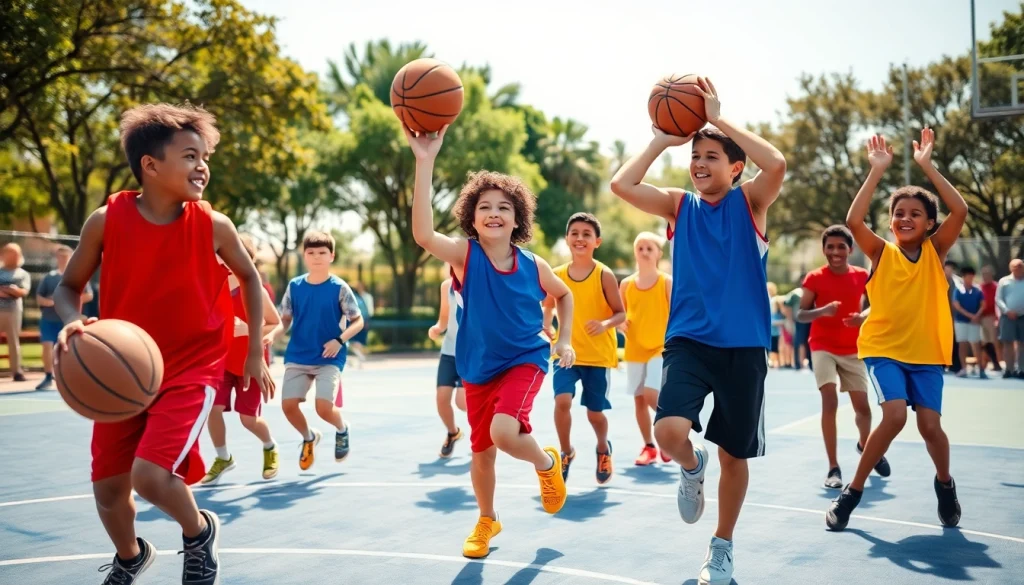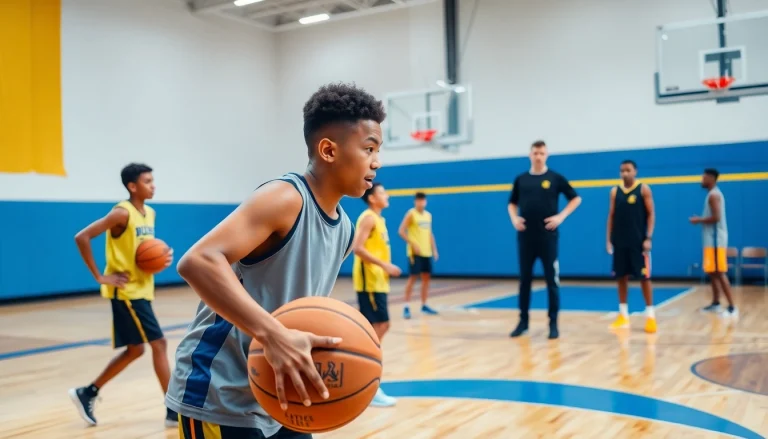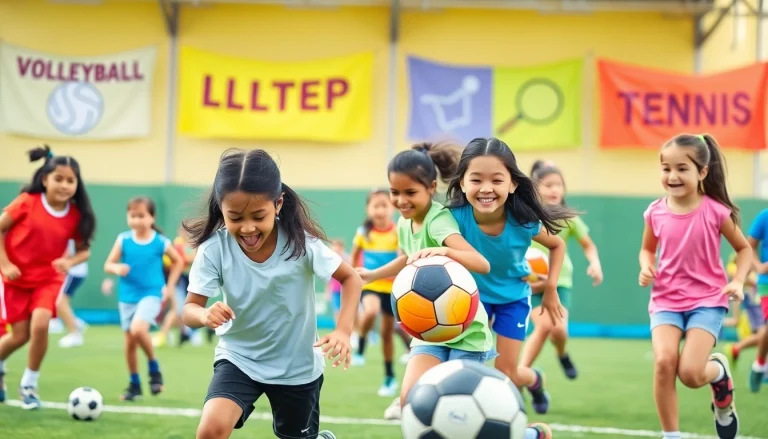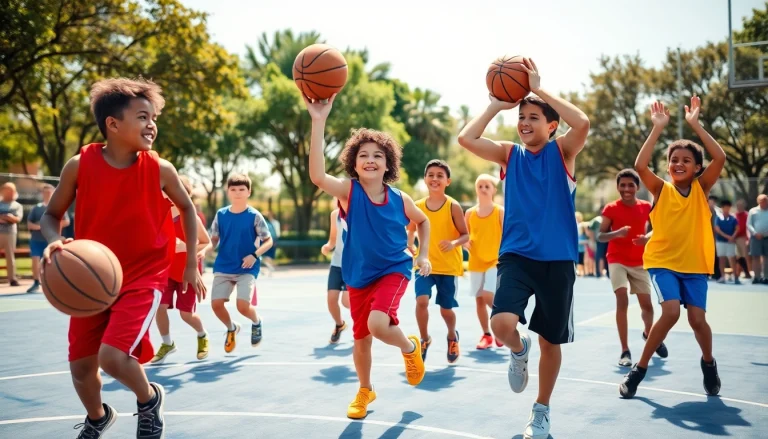
Understanding Young Basketball Enthusiasts
Who Are Young Basketball Enthusiasts?
Young basketball enthusiasts are not just kids who play basketball; they are a vibrant group of individuals who are passionate about the game and aspire to learn, grow, and excel. This enthusiastic category can include players from ages 5 to 18, but it encompasses more than just aspiring athletes. These young individuals embark on a journey filled with excitement, competition, teamwork, and personal development through the sport of basketball. They often play in local leagues, participate in camps, and follow professional basketball, dreaming of emulating their favorite players. For young basketball enthusiasts, basketball is not only a pastime but also a means of building lifelong skills.
The Importance of Youth Engagement in Sports
Engaging young people in sports like basketball is crucial for their overall development. Participation in sports helps children develop physically, socially, and emotionally. Physically, basketball promotes cardiovascular fitness, coordination, and agility. Socially, it encourages interaction with peers, teaching them important skills such as teamwork and communication. Moreover, emotionally, participating in sports can help build confidence and resilience in young athletes.
Furthermore, youth engagement in sports prepares them for future endeavors outside the court. Involvement in basketball can teach young players about discipline, time management, and goal-setting, which can translate to academics and their future careers. These qualities are essential in fostering a well-rounded individual who excels not just in sports but in life.
Key Characteristics of Young Athletes
Understanding the key characteristics of young athletes offers insights into how to support their development effectively. Firstly, young athletes display a natural inclination towards competition. They possess a strong drive to improve and succeed, often pushing themselves to outperform their last game or practice. This characteristic is essential in fostering a growth mindset.
Secondly, curiosity is prominent among young basketball enthusiasts. They are eager to learn new skills, experiment with techniques, and seek to understand the nuances of the game. This curiosity often leads them to ask questions, watch videos, and emulate professional players’ moves.
Lastly, resilience is a vital attribute in young athletes. Given the nature of sports, they experience both victories and defeats; how they respond to challenges defines their future success. Encouraging young athletes to be resilient helps them cope with failures and setbacks, ultimately aiding them in accepting that losses can be vehicles for learning and growth.
Skills Development for Young Basketball Enthusiasts
Fundamental Skills Every Young Player Should Master
To become proficient in basketball, young players must master several fundamental skills. These include dribbling, shooting, passing, and defense. Dribbling is crucial as it allows players to control the ball while navigating the court. It involves techniques such as crossovers, behind-the-back, and hesitation moves, which can be practiced in drills alone or within team settings.
Shooting is another foundational skill. A young player should learn proper shooting techniques, including stance, alignment, and follow-through. Techniques like layups and free throws should be emphasized early on so that young players can build their confidence in shooting.
Passing, often an underrated skill, is essential for teamwork. Effective passing can create openings and facilitate scoring opportunities. Young players should practice different types of passes – bounce passes, chest passes, and overhead passes – understanding when to use each type during a game.
Lastly, defensive skills are vital to any player’s development. Learning how to maintain a defensive stance, block shots, and perform steals contributes to the player’s overall effectiveness in the game while fostering an understanding of the importance of teamwork in defensive strategies.
Effective Drills to Enhance Basketball Skills
Drills are an invaluable aspect of basketball training. They provide structure and enhance skill acquisition in young basketball enthusiasts. For dribbling, the “Cone Dribble” drill challenges players to navigate through cones set up in various patterns, enhancing their control and agility. The “Around the World” shooting drill helps improve shooting accuracy as players aim to shoot from designated spots around the key.
Passing drills, such as the “Partner Pass,” focus on improving accuracy and timing, as players pass back and forth while moving. For defense, the “1-on-1 Shadow Drill” allows young players to learn how to position themselves and react to an opponent’s movements, honing their defensive instincts.
Incorporating these drills into a regular practice schedule keeps training diverse and engaging for young athletes. Coaches and parents should also encourage players to practice outside of structured sessions, fostering self-discipline and initiative.
Setting Realistic Goals for Skills Improvement
Goal-setting is essential in any athlete’s development, and for young basketball enthusiasts, it sets the stage for continued growth. Goals should be specific, measurable, achievable, relevant, and time-bound (SMART). For example, a young player might set a goal to improve their free-throw shooting percentage from 60% to 70% by the end of the season.
Coaches and parents should work with young players to establish these goals, helping them understand both short-term and long-term objectives. Regularly revisiting these goals during the season allows athletes to track their progress and make adjustments if necessary. Rewarding achievements, no matter how small, boosts motivation and encourages continued effort toward skill mastery.
Fostering a Love for Basketball
Creating an Inspiring Training Environment
An inspiring training environment is fundamental in fostering a love for basketball among young athletes. This environment should be positive, inclusive, and supportive, allowing children to express themselves and adopt a passion for the game. Coaches should prioritize creating a fun atmosphere where winning is not the sole focus, but personal growth and learning are celebrated.
Including variations in training sessions, such as incorporating games or fun drills, helps maintain enthusiasm. Coaches should encourage creativity on the court, allowing young players to explore their styles. Celebrating effort plays a crucial role in building enthusiasm; coaches and parents should acknowledge hard work and dedication over mere results.
Involvement in Community and Local Camps
Involvement in community basketball programs and local camps is another excellent way to inspire young enthusiasts. Community camps often provide opportunities for young athletes to develop skills in an engaging and supportive atmosphere while also fostering social connections with peers who share the same interests. Participation in local leagues or camps exposes players to various coaching styles and philosophies, enriching their experience.
Additionally, programs like NBA Cares and similar initiatives help connect young players with mentors and role models, cultivating a community spirit around the game. These relationships can inspire young athletes to pursue their dreams, both on and off the court.
Encouraging Teamwork and Sportsmanship
As young basketball enthusiasts develop their skills, it’s vital to instill values of teamwork and sportsmanship. Coaches and parents should emphasize the importance of working together, sharing accolades, and supporting one another even when facing challenges. Team-based drills and activities are effective in reinforcing this ethos.
In addition, educating players on the principles of sportsmanship – respect for opponents, humility in victory, and grace in defeat – builds character. Young athletes who understand these values carry them beyond the court, impacting their interactions and relationships throughout their lives.
The Role of Coaches and Mentors
How Coaches Impact Young Basketball Enthusiasts
Coaches play a pivotal role in shaping the experiences of young basketball enthusiasts. They serve not only as skill instructors but also as mentors, guiding young players through challenges, and encouraging them to strive for excellence. A good coach recognizes each player’s unique potential, motivates them to push their limits, and celebrates achievements, fostering a positive growth environment.
Effective coaching also involves ongoing communication. Coaches should provide constructive feedback that empowers young players rather than diminishing their confidence. By fostering strong relationships built on trust and mutual respect, coaches can deeply influence young athletes’ love for the game and their overall development.
Finding the Right Coach for Young Players
Choosing the right coach is crucial for young basketball enthusiasts. Parents and players should look for coaches who have both technical knowledge of the game and a commitment to fostering a positive and inclusive team culture. It’s beneficial when the coach has experience working with youth, understanding how to engage and motivate young players effectively.
Additionally, observing a coach’s session before committing to a team can provide insights into their coaching style and philosophy. Young athletes thrive under coaches who balance skill development with fostering a passion for the game, so prioritizing these aspects when selecting a coach is essential.
Developing Leadership Skills Through Training
Basketball is as much about leadership as it is about athletic skills. Coaches can incorporate leadership development into their training by assigning roles on and off the court, allowing young players opportunities to take charge during drills and scrimmages. For example, rotating captain responsibilities during practice helps players learn how to lead a team effectively.
Additionally, engaging younger players in team discussions about strategy, setting group goals, and encouraging them to support one another fosters a sense of responsibility and collaboration. As these young athletes learn to guide their teammates, they also develop essential life skills that extend well beyond basketball.
Promoting Health and Fitness Among Young Players
The Importance of Physical Conditioning
Physical conditioning is foundational for young basketball enthusiasts. At a young age, developing strength, endurance, flexibility, and coordination is vital for long-term success in the sport. Conditioning exercises should be age-appropriate, focusing on fundamental movements like running, jumping, and agility drills.
Young athletes should also be educated on the importance of warming up and cooling down, as these practices help prevent injuries. Regular physical activity beyond basketball practice enhances overall fitness, contributing to better performance on the court.
Nutritional Advice for Young Athletes
Alongside physical conditioning, nutrition plays a critical role in young athletes’ performance and recovery. Parents and coaches should emphasize balanced diets rich in fruits, vegetables, whole grains, proteins, and healthy fats. Educating young players on the importance of hydration is equally crucial, helping them understand how it impacts their energy levels and performance.
Snacking wisely before practices and games can also provide the required energy. Options like bananas, granola bars, and yogurt are excellent pre-game snacks. Encouraging young athletes to appreciate nutritious foods helps them develop healthy habits that can last into adulthood.
Balancing Sports, Academics, and Social Life
For young basketball enthusiasts, maintaining a balance between sports, academics, and social life can be challenging yet rewarding. Establishing a structured schedule that includes time for practice, homework, and social activities helps young athletes manage their responsibilities effectively. Coaches and parents should encourage young players to prioritize their education while still finding passion in their sport.
Creating an environment where academics and sports coexist harmoniously allows young athletes to enjoy the benefits of both pursuits. Open communication with players about their academic commitments can help them feel supported and understand the importance of balance.





